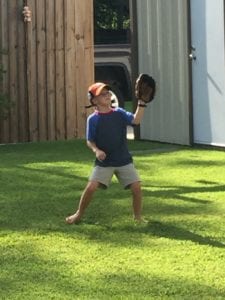When I was younger, I tried out several sports: basketball, softball, cheer-leading, volleyball, swimming, you name it. I had no idea what my interests were, let alone my skill set! My patient parents let me and my three siblings try out whatever was in season, awaiting the day that I learned that basketball wasn’t for me.
 I learned so much in the process! To this day I can impress my unsuspecting boys with my knowledge of sports, albeit thin. I’m a regular Jane of all trades, master of none. This comes in handy, especially with my oldest, who will switch from learning the butterfly stroke to fielding grounders to perfecting his putting quickly enough to give us whiplash.
I learned so much in the process! To this day I can impress my unsuspecting boys with my knowledge of sports, albeit thin. I’m a regular Jane of all trades, master of none. This comes in handy, especially with my oldest, who will switch from learning the butterfly stroke to fielding grounders to perfecting his putting quickly enough to give us whiplash.
He wants to try everything. He was given a tennis racket for a birthday and wanted lessons. He saw his grandfather playing golf and begged him to take him on the course for a day. He got lacrosse sticks from a cousin and insisted on giving it a try. He takes a genuine interest in different sports and will exhaust himself learning as much as he can all by himself, begging any one of us in the house to help him practice. The kid even started a “Sports Club” to get other enthusiasts together for the sheer goal of trying, learning, and playing different sports. And he tends to be a pretty coach-able kid: he appreciates constructive criticism and often excels, even if only based on his ability to listen rather than raw talent.
“Raw talent.”


I used to think I knew what this meant. I believed it was inherent giftedness. Like Bo Jackson, who excelled at anything he tried his hand at, talent seemed transferable. If you were an excellent athlete, you could try any sport and eventually end up picking a specialty without feeling you had sacrificed any time building athleticism in the process. You could spend years trying several sports, limited only by seasons and availability. Six years trying basketball and football only to eventually settle on baseball as your sport of choice didn’t put you at a six-year disadvantage compared to your peers; contrastingly, it could have actually made you a better, more well-rounded athlete.
But not anymore. Now there’s no time to try other sports. You have to get that out of the way by the time you learn to tie your cleats. If you can’t declare your specialization before learning cursive, you might as well hang up your batting gloves. Or swim cap. Or racing bib. Tournament and “elite” teams combined with year-long “seasons” force the hands of parents to choose early and carefully, often without the input of the child.
While time and money used to be the only obstacles to a child’s athletic inclinations, now you have to add the lag time of coaching that he’s missing in comparison to other kids his age who have committed to playing year-round. In second grade.
I can’t afford this rat race of sports, and I don’t just mean financially. I don’t have the energy. This is not what sports looked like when I was this age, and I don’t believe it’s an improvement. I’d like to continue exposing him to different sports, signing him up for mini-camps and recreational opportunities, and relying on his inherent talent rather than exposure to coaching early and often.


Then I ask myself what I’m missing. Coaching, experience, and a shot at that college scholarship, which we need to start preparing for now? But at what cost? My kids throwing their arms out and missing out on experiencing other sports in the meantime? Ones that they may actually excel at and enjoy more than the one they’re “investing” in currently?
I honestly thought we could wait and let him decide the sports he would play based on (call me crazy) his interests. But here we are facing decisions about feeder teams for the high school level. at age 8.
















